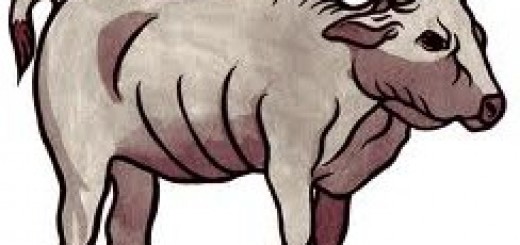By Avner Friedmann
The Parshah states[1]: “You shall make a head-plate (tzitz) of pure gold and engrave on it like the engraving of a signet – ‘Holy to HaShem’. You shall place it on a thread of blue wool, set it on the turban, and it shall be across the front of the turban. It shall be on Aharon’s forehead; Aharon shall bear the iniquity of the sacrifices that the children of Israel consecrate for any of their sacrificial offerings. It shall be on his forehead continually to gain favor for them before HaShem.”
The vestments of the Kohanim (priests) were worn “for glory and splendor,”[2] for the honor of HaShem and the Kohanim who wore them. The ordinary Kohanim wore four vestments while performing their service in the Holy Temple. These were trousers, a tunic, belt, and turban. The Kohen Gadol (High Priest) wore four additional vestments. These were a breastplate, Ephod (apron), Robe, and Tzitz (Head-plate). The Kohen Gadol thus wore a total of eight vestments.
Each of the eight vestments helped atone for certain sins, in conjunction (of course) with repentance on the part of those guilty of these sins. The Tzitz worn on the forehead of the Kohen Gadol atoned for brazenness[3]. Now, what is the connection between brazenness and the forehead? A person who is brazen has no fear of Heaven, or of any other authority. He therefore raises his forehead against them out of sheer shamelessness.
In the Holy Tongue (Biblical Hebrew) the word “Tzitz” means “to glance”. The Holy Zohar[4] states that the purpose of the Tzitz was for people to glance upon it. When a person looked at the Tzitz, the Kohen Gadol could likewise see whether that person was righteous or wicked. When a righteous person glanced upon it, the letters of HaShem’s name that were engraved upon the Tzitz would radiate. A glimmer of light would radiate out, which the Kohen Gadol could see reflected on the person’s face for the moment of a glance, and would then fade away. If this happened, the Kohen Gadol understood that the person was pleasing to HaShem. However, if the person’s face reflected no radiance, he understood that the person was a brazen individual. However, by merely seeing HaShem’s name on the Tzitz, a person would become brokenhearted, humble and remorseful of his misdeeds before HaShem. This would be apparent on his face and he would be forgiven.
It states in Mishnah,[5] “Yehudah ben Teima says: Be as brazen as a leopard, as light as an eagle, run like a deer and as brave as a lion, to do the will of your Father in heaven”. He further said, “The brazenfaced are headed for Gehinom (hell) and the shamefaced for Paradise” etc.
However, this begs a question. If the brazenfaced are headed for Gehinom, why does Yehudah ben Teima also tell us, “Be as brazen as a leopard?” Moreover, the Talmud teaches us[6] that because by nature, Jews are more brazen than other nations; therefore the Torah was specifically given to them. It further states that if not for Torah, no nation could have stood in their way because of their brazenness. However, the Rabbis also stated about whoever is brazen, that we assume that he was not present at Mount Sinai during the giving of the Torah and that he has no portion in Torah. This leaves us with a conundrum; these statements seem to contradict one another! Are we or are we not, supposed to be brazen?
The solution is[7] that there is positive, holy brazenness and negative, unholy brazenness. On the side of holiness, in order for the Jewish people to remain faithful to HaShem and have the fortitude to withstand their many enemies throughout history, they must be brazen to whoever should attempt to uproot their faith and separate them from their Father in heaven. Moreover[8], this physical world is very distracting to our service of HaShem. It causes spiritual slumber, so to speak. Therefore a Jew needs to be bold and brazen against those forces that draw him away from closeness to HaShem.
Without Holy Brazenness[9] a Jew could not withstand the power of the Yetzer HaRa (the evil inclination). On the other hand, Unholy Brazenness stems from self-centeredness and an inflated ego. This kind of brazenness can only lead to Gehinom, and it is this kind of brazenness that the Tzitz atoned for.
Many of the personal trials and tribulations we go through are brought about by HaShem to test our character and are associated with brazenness. In other words, when Holy Brazenness is awakened within us, Unholy Brazenness is likewise awakened. We must be on guard and astute to differentiate between them and recognize whether we are being awakened with brazenness for the sake of Heaven or for our own sake.
This being the case, that it is so easy to mistake one for the other, Holy Brazenness should always be accompanied by accepting whatever circumstance we find ourselves in, with love. We should try to be as patient and accepting of all Jews and give them the benefit of the doubt.
One of the most difficult challenges is when we feel wronged, insulted or humiliated. Our natural instinct is to lash out and react harshly. If a person restrains his anger at such moments, this does wonders in correcting whatever Unholy Brazenness he may possess.[10] This can be compared to the atonement brought about through glancing at the Tzitz of the Kohen Gadol.
Fortunate is the person who is aware of his personal character traits and works to eradicate the bad and nurture the good. Such a person will have a share in this world and in the world to come. May we all to have the Holy Brazenness necessary to bring about the true and complete redemption when, “The earth will be filled with the knowledge of HaShem as the waters cover the ocean floor”, through our righteous Moshiach, speedily on our days. Amen
[1] Shemot 28:36-38.
[2] Shemot 28:2.
[3] Zevachim 88b.
[4] Vayakhel 217b, 218b.
[5] Avot 5:20.
[6] Beitza 25b.
[7] Chatam Sofer and in Likutei Moharan Torah 22.
[8] Sefer Hachaim, Perek 5, Mishna 20.
[9] Likutei Moharan Torah 22.
[10] Rav Nachman, Likutei Moharan, Torah 6.






















